social bookmarking tools:
 |
|
| Available RSS Feeds |
|---|
 - Top Picks - Top Picks |
 - Today's Music - Today's Music |
 - Editor's Blog - Editor's Blog
|
 - Articles - Articles
|
Add Louisville Music News' RSS Feed to Your Yahoo!
|
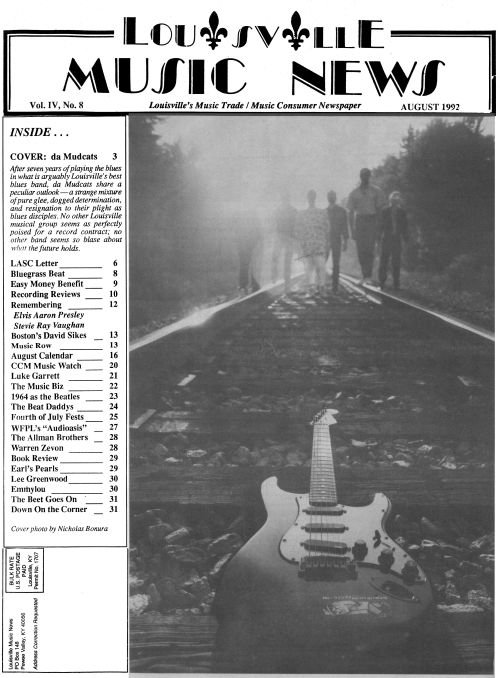
da Mudcats
By Bob Bahr
Photos by Nicholas Bonura
Once the blues
Gets a piece of you.
You can't blame the blues
You shouldn't blame the blues
Oh no, oh never
Never blame the blues
— Susan O'Neil and Rob Pickett
"Don't Blame the Blues"
After seven years of playing the blues in what is arguably Louisville's best blues band, da Mudcats share a peculiar outlook – a strange mixture of pure glee, dogged determination and resignation to their plight as blues disciples. No other Louisville musical group seems as perfectly poised for a record contract; no other band seems so blase about what the future holds.
Said vocalist Susan O'Neil and harmonica player Jim Rosen about their plans in a recent interview: "Just keep doing what we're doing." Elaborated guitarist Rob Pickett ever so slightly, "Continue to get better. Put out product."
If that sounds low-key, see a high-key Mudcats gig and watch the fun this band has while performing. Playing the blues well is enough for these musicians; all the rest of the music business seems like window dressing.
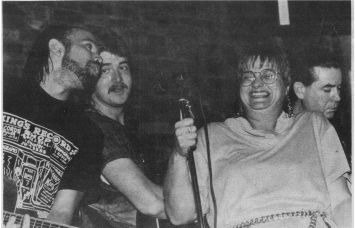
And Rosen especially isn't one for window dressing. A big bear of a man who manages to take center stage even when he is playing in the wings, Rosen is a natural bandleader who is comfortable deferring the spotlight to others. His intensity, gruff good humor and blue-collar attitude set the tone of Mudcats shows.
There doesn't seem to be unfounded idealism or youthful impatience in this sextet no more than there are stuffed shirts within this group. They seem settled in their brand of blues and resistant to music-circle sniping. While the music-industry machine grinds, da Mudcats do what they must.
Record companies are sniffing around. Da Mudcats are plugging away at gigs at the Cherokee Blues Pub. Blues experts are touting Jim Rosen as one of the finest harp blowers in the nation. Rosen is laughing in delight as he works the wah-wah pedal during one of Rob Picket's melodic guitar solos. Legendary blues mandolinist (and noted traditionalist) Yank Rachell makes it a point to sit in with the band during a recent Indianapolis gig. Da Mudcats perform a slow blues more reminiscent of Patsy Cline than Sleepy John Estes during an acoustic set at Butchertown Pub.
If da Mudcats sign on the dotted line and put their grooves down on a national record, you can bet it will be on their own terms.
Those terms are a blues-based form of music with tentacles extending into jazz, rock, country and pop music. They are first and foremost a blues band, yet within seconds of hearing da Mudcats, their differences are evident to the listener.
Contemporary and traditional — yeah-—-and I think we go a little bit beyond that sometimes. I think we get into some avant garde here and there, Rosen said.
The blues chord progressions — the most recognizable chord progressions in all of Western music —are represented in da Mudcats' music The familiar grooves and the patent licks show up now and again. Anyone would recognize this
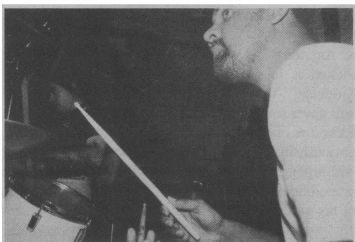
Yet the silkiness and sass in O'Neil's voice is jazzy. Pickett's guitar work has the ring of progressive rock 'n' roll The rhythm section, composed of drummer Gene Wickliffe, bassist Larry Holt and keyboardist Doug Lamb, is blissfully solid and straightforward. And then there's Rosen, an avowed jazz fan who cites Grand Ole Opry harpist Deford Bailey as an influence.
"Jim Rosen is one of the very best harmonica players in the country, bar none and I hear a lot of harmonica players," said Scott Mullins, co-founder and past vice president of the KYANA Blues Society and former editor of its newsletter. The founder and host of the "Saturday Night Blues Party" radio show on WFPL, Mullins can hardly suppress his enthusiasm for da Mudcats and Jim Rosen. "They are one of a couple of blues bands that deserve a record contract. They are different in that they are developing their own sound."
The scope of Jim's knowledge of the music and the scope of his love of the music encompass a very wide field," said Perry Aberli, president of the KYANA Blues Society. "I think Jim can do just about whatever he wants to do with his harp playing."
Indeed, Rosen's harmonica playing, gravelly singing and imposing stage presence make any listener take notice. Equally adept at making the harmonica slather out a dirty, nasty slab of blues or a clean-cut, crisp string of notes, Rosen is a master of the blues harp.
"He doesn't really limit himself to playing harmonica, as such," Pickett said. "He's playing music." Following Rosen's solo lines is like driving along a rolling country road unfolding over gentle hills -— except he gives the thrills of a highway carved precariously on the side of a mountain.
He can sound simultaneously traditional and progressive, which is a handy skill in the fractional, factional world of blues fans.
"They use the blues as the base in their music and then move beyond," Aberli said. "They don't feel locked into... they don't feel like they have to conform to a certain level of expectations."
Mullins was blunter..
"With some people, you just can't win. If a band plays traditional blues, then they dismiss them and say, 'All they are doing is ripping off old Chess records. ' Then if they try something progressive, those same people will say that they are bastardizing the blues by putting a rock element in there, or whatever," Mullins said.
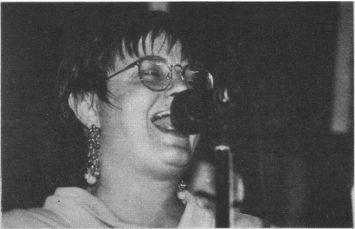
That kind of argument has caused a considerable rift in Louisville's blues community. Da Mudcats stay above the fray, mostly just laughing at all the hubbub.
"We can do a lot of things in a very traditional manner," Pickett said. "But getting back to copping somebody else's attitude and trying to do it like a note-for-note, exactly the same sound, it's almost like going backwards. These people created it and made it and you can't recreate magic You have to kind of do your own.
"In all fairness to ourselves, I think it would be limiting and it would take a lot of the fun out of it, if we didn't experiment and try to make something new," he continued. "Make a mark of our own, utilizing everybody's musicianship. I think it would get pretty boring and we'd sound like a lot of other bands."
As long as Pickett is in da Mudcats, they will never sound like a lot of other bands Pickett is one of those guitarists who quite obviously lives in another world, one decorated with arpeggios, feedback and sweet melodies draped here and there. His solos and many of his guitar fills at the end of phrases, are glimpses into Pickett's guitar world he seems to invite the listener to visit, or perhaps he is putting his creation proudly on display. At any rate, it's easy to get lost in his solos.
Pickett often has no use for the tempo of the song. In revealing what he wants to say musically, he may slow it down or speed it up, lapping over the measure lines leisurely, sticking on a note two or three times for emphasis. He may have developed this technique from his stints with local progressive rock groups with a powerful sound. One such group, Mantis, took the place of Pickett's term in college. He was enrolled at the University of Louisville "for about a minute or so" before joining the group in the early 1970s.
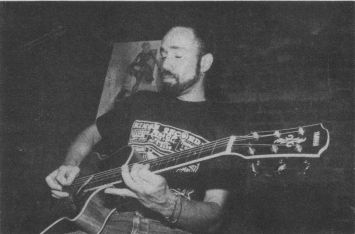
Before this baptism into professional music, Pickett's primary influences were his friends, the radio and his family's musical leanings. From his piano-playing mother, Pickett was exposed to Big Band music and Billie Holiday.
His grandfather taught him the fundamentals on a ukelele and taught him Hoagy Carmichael tunes. On the radio, he heard the pop and rock of the day. And in between the cracks, he found John Lee Hooker and the legends of the blues.
Foundation music was always just that to me—the real deal Pickett said. "Muddy Waters, music with attitude that goes beyond the slick spinoffs you know? T hat's why I can say that I like any guitar player that plays with a lot of heart. It can be pretty much any style, as long as it's real music. I can't play every style well, but I can listen pretty good," he said with a laugh.
Pickett played Les Paul guitars before joining da Mudcats four years ago, but now plays guitars with the classic Fender Stratocaster-style body and sound.
"I find Strat-style guitars to be more flexible on stage, allowing me to go from song to song without changing guitars," he said. Pickett doesn t use many effects, just "odds and ends sometimes just to spark myself."
One of those effects is the wah-wah pedal which he lets his high-school friend Jim Rosen play on stage left. "He makes the faces while I'm busy playing the guitar" Pickett laughed.
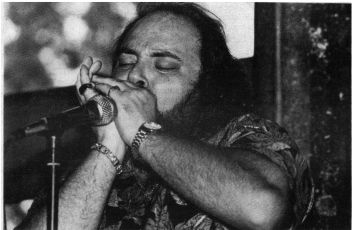
While it is obvious that Pickett feeds off Rosen's intensity onstage, Pickett said da Mudcats are very much a group effort. "It's bigger than that," he said. His drive comes from "knowing that I'm in da Mudcats. Really. Knowing that I'm part of it."
Indeed, da Mudcats are a cohesive whole. On paper, the band may seem like the Jim Rosen Band, but it isn't so. O'Neil's clear, smooth vocals naturally garner attention and Pickett's guitar solos are destined to gather screams from blues fans. But the rhythm section puts the muscle into the band. Pickett, for one, is a huge fan of the Mudcats rhythm section.
"You almost get hypnotized by it because it seems so subtle, but they are laying down the fire," Pickett said. "Sometimes you can just lean on them, just lean back and they'll just hold you up. It's real cool."
Drummer Wickliffe could not possibly be more solid, laying down a straight spine for Holt to wind his sinewy bass lines around. Given solo room, Holt expands upon his funky side, fluidly popping along on the fretless bass. Keyboardist Lamb can add texture and soloing power — or beef up the guitar sound with better than average acoustic guitar work.
All members contribute songs and arrangements to the band. That helps account for the varied influences in the Mudcats sound. Rosen describes Mudcat blues as being most like Chicago blues, regionally speaking which in turn means the blues of the Mississippi delta.
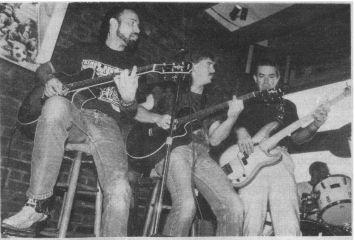
"Chicago blues aren't anything but Delta blues. The only difference is, Muddy Waters and a bunch of those guys went to Chicago and put electricity and a black backbeat to it," said Rosen.
"Everything is filled up full time The guitar player s taking a ride, the harmonica player is playing something behind him or is playing something that is equal to him or on top of him You start moving out West, you start moving into Texas blues and you start running into spaces. You've got all this wide open space, it's not all filled up. The Texas people were influenced by a lot of jazz players. Then you take it up North, up to northern California, the contemporary people like Joe Louis Walker and Robert Cray, they aren't jazz influenced, they are R&B influenced It all depends on what part of the country that you come from."
Rosen comes from Louisville, a town that traditionally does not support local blues acts. He has worked at a variety of odd jobs to support his music habit and sat in playing harp with bands that dabbled in blues until Smoketown Red, a venerable local bluesman, hired him in the early 1980s.
Rosen' s recollections of that period are a bit fuzzy. "I drank so much whiskey back then I tend to forget." His frequent cigarette habit and a penchant for straight whiskey still color his growling, Louis Armstrong-ish vocals.
Rosen was a part of the blues band the Bluebirds during the local blues upswing fostered in the mid 1980s by the opening of Fat Cats at the comer of Speed Avenue and Bardstown Road. Fat Cats nearly single-handedly invigorated the Louisville blues scene, spawning countless blues bands by giving them a stage to play on.
The movement has since been fostered by the Cherokee Blues Pub on Bardstown Road, the defunct Stage Deli on Broadway and the defunct Barry's on Frankfort Avenue, where da Mudcats were a house band for two years. Last September, Phoenix Hill Tavem gave added credibility to the local blues scene by initiating Blues Tuesdays and other mainstream bars such as Flaherty's, Jim Porter's and Butchertown Pub have followed suit with occasional blues shows.
The problem now is the lack of fan support.
"People in Louisville don't support local artists," Rosen said. "They'll go downtown for those, what do you call them? "Lonesome Pine Specials," O'Nei1 answered.
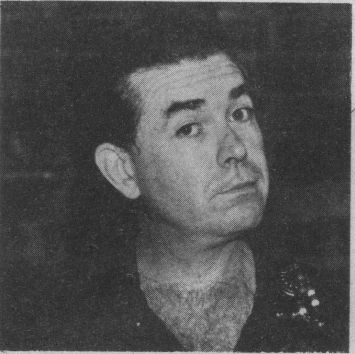
"You go in there [LPS shows at the Kentucky Center for the Arts] when they're playing, the place is packed with people from all walks of life," said Rosen. "But those people will not go to a club. They like to read about it. They want to read about it in the newspaper. They want to read about it in a magazine. But very seldom will you see those people coming to a club."
"We pretty much see the same people over and over," said O'Neil.
The regulars are used to seeing O'Neil dress down for gigs. She matches the rest of the band's casual attire with a refreshing disregard for the sexist mandate that women must wear flashy clothes in the entertainment field.
Her voice, a cool lacquer finish over the hot, rough blues emanating behind her, comes from years of singing in a variety of settings, including one notable performance at the Okolona Optimist Club. O'Nei1, at the age of seven, sang "Johnny Angel" a capella in her first public performance.
"It's the first time I remember people applauding and I remember thinking, 'Hey, I like this!'" O'Neil laughed. "I pretty much sang in church all the way through grade school and high school. I quit fora time in my 20s because I had other things going on."
She kept the flame going (it was not a blues flame yet) through talent shows and other performances until 14 years ago, when she sang with Just Foolin', a local rock group that covered Spirit, Janis Joplin, Little Feat and Aretha Franklin, among others. Her marriage to Rick O'Neil hooked her up with Kessler's Friends, with whom she sang full-time for two years and managed for three. O'Nei1 continued to manage Kessler's Friends, a local variety group, for a while after da Mudcats fonned, until the blues band started working too many nights for O'Neil to work both jobs. She continues to work full-time as the assistant to the director at the Museum of Natural History and Science.
O'Neil hooked up with Rosen after she auditioned for the vocalist slot in the Bluebirds. She didn't get the gig, but Rosen called her up shortly thereafter when he quit the band in dissatisfaction. The two, along with drummer Wickliffe, formed the Mudcats in 1985. Guitarist Andy Brauner yielded his slot to Pickett four years ago. A string of bass players came and went before Holt joined the band three years ago. Lamb is the last member to join da Mudcats, coming in the fold last year.
Da Mudcats took their name from a Muddy Waters song titled "Mudcat." And how did the "da" get added to the quintet's name? "I d0n't know how that got started," Rosen said, looking quizzically at O'Neil.
"It started out 'The Mudcats' and . . . I don't know," O'Neil answered. "I don't know who started it and I don't know when it happened." O'Neil seemed as surprised as anyone. "Rob started it, I think."
"Just dialect," she supposed. "Plus there's another group called the Mudcats in Nashville.
'Somebody and the Mudcats.' It just seemed appropriate to change it."
Despite the looming talents in the band, no one seems to try ruling with an iron fist.
"Yeah, we're democratic," said O'Neil.
"We want everybody to take the heat," she said laughing.
"What the hell you mean there were no people here tonight?" Rosen role-played.
Record labels like bands with a regional following and da Mudcats are indeed inching north into Indianapolis in an effort to broaden their support, base. They already seem to have Louisville in their pocket, judging by their consistently busy performance schedule.
But you can just forget any notion of the band becoming slicker. Da Mudcats eschew any semblance of a light show and they mix their sound on stage. They explain it away with one essential statement.
"We're a blues band."
